Three-point type seat belt

 WARNING
WARNING
► Every person who drives or rides in this
vehicle should use a seat belt at all
times.
► Do not ride in a moving vehicle when the
seatback is reclined. This can be dangerous.
The shoulder belt will not be
against your body. In an accident, you
could be thrown into it and receive neck
or other serious injuries. You could also
slide under the lap belt and receive
serious internal injuries.
► For the most effective protection when
the vehicle is in motion, the seat should
be upright. Always sit well back in the
seat with both feet on the floor and
adjust the seat belt properly.
► Do not allow children to play with the
seat belts. Most seating positions are
equipped with Automatic Locking Retractor
(ALR) mode seat belts. If the seat
belt becomes wrapped around a child’s
neck with the ALR mode activated, the
child can be seriously injured or killed if
the seat belt retracts and becomes tight.
This can occur even if the vehicle is
parked. Unbuckle the seat belt to release
the child. For the center of the 3rd row
bench seat, the connector tongue may
also be released. Release the connector
tongue by inserting a suitable tool (such
as a key) into the connector buckle. If
the seat belt can not be unbuckled or is
already unbuckled, release the child by
cutting the seat belt with a suitable tool
(such as a knife or scissors) to release
the seat belt.
Fastening the seat belts
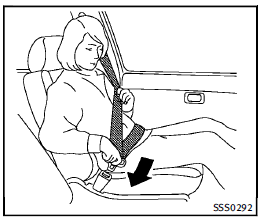
1. Adjust the seat. (See “Seats” earlier in this section.). 2. Slowly pull the seat belt out of the retractor and insert the tongue into the buckle until you hear and feel the latch engage.
► The retractor is designed to lock
during a sudden stop or on impact.
A slow pulling motion permits the
belt to move, and allows you some
freedom of movement in the seat.
► If the seat belt cannot be pulled
from its fully retracted position,
firmly pull the belt and release it.
Then smoothly pull the belt out of
the retractor.
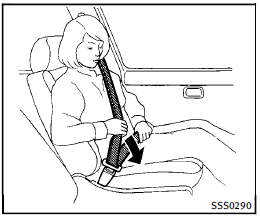
3. Position the lap belt portion low and snug on the hips as shown. 4. Pull the shoulder belt portion toward the retractor to take up extra slack. Be sure the shoulder belt is routed over your shoulder and across your chest. The three-point type seat belts have two modes of operation:
► Emergency Locking Retractor (ELR)
► Automatic Locking Retractor (ALR)
The Emergency Locking Retractor (ELR)
mode allows the seat belt to extend and
retract to allow the driver and passengers
some freedom of movement in the seat.
The ELR locks the seat belt when the vehicle slows down rapidly or during impacts. The Automatic Locking Retractor (ALR) mode (child restraint mode) locks the seat belt for child restraint installation. When the ALR mode is activated the seat belt cannot be extended again until the seat belt tongue is detached from the buckle and fully retracted. The seat belt returns to the ELR mode after the seat belt fully retracts. For additional information, see “Child restraints” later in this section. The ALR mode should be used only for child restraint installation. During normal seat belt use by an occupant, the ALR mode should not be activated. If it is activated, it may cause uncomfortable seat belt tension.
 WARNING
WARNING
When fastening the seat belts, be certain
that seatbacks are completely secured in
the latched position. If they are not completely
secured, passengers may be injured
in an accident or sudden stop.
Unfastening the seat belts
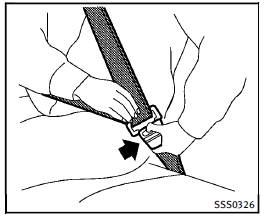
To unfasten the seat belt, push the button on the buckle. The seat belt automatically retracts.
Checking seat belt operation
Seat belt retractors are designed to lock seat belt movement by two separate methods:
► When the belt is pulled quickly from the
retractor.
► When the vehicle slows down rapidly.
To increase your confidence in the seat
belts, check the operation as follows:
► Grasp the shoulder belt and pull
forward quickly. The retractor should
lock and restrict further belt movement.
If the retractor does not lock during this
check or if you have any question about
seat belt operation, see an INFINITI retailer.
Center of 2nd row seat (if so equipped)
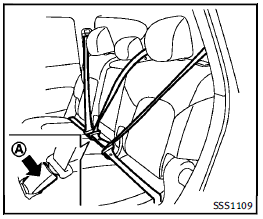
Selecting correct set of seat belts: The center seat belt buckle is identified by the CENTER mark A . The center seat belt tongue can be fastened only into the center seat belt buckle.
3rd row center seat belt
The 3rd row center seat belt has a connector tongue 1 and a seat belt tongue 2 . Both the connector tongue and the seat belt tongue must be securely latched for proper seat belt operation.
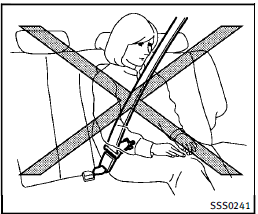
 WARNING
WARNING
► Always fasten the connector tongue and
the seat belt in the order shown.
► Always make sure both the connector
tongue and the seat belt tongue are
secured when using the seat belt or
installing a child restraint. Do not use
the seat belt or child restraint with only
the seat belt tongue attached. This could
result in serious personal injury in case
of an accident or a sudden stop.
Stowing 3rd row center seat belt:
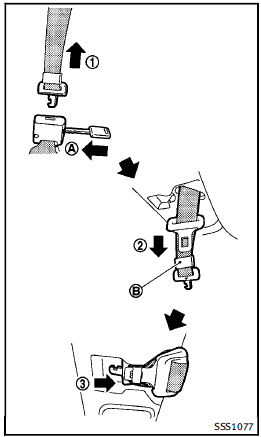
When folding down the 3rd row seat, the 3rd center seat belt can be retracted into a stowed position. 1. Hold the connector tongue 1 so that the seat belt does not retract suddenly when the tongue is released from the connector buckle. Release the connector tongue by inserting a suitable tool such as key A into the connector buckle. 2. Store the seat belt tongue into the tongue holder B first 2 . 3. Store the connector tongue into the retractor base 3 .
 WARNING
WARNING
Do not unfasten the 3rd center seat belt
connector except when folding down the 3rd
seat.
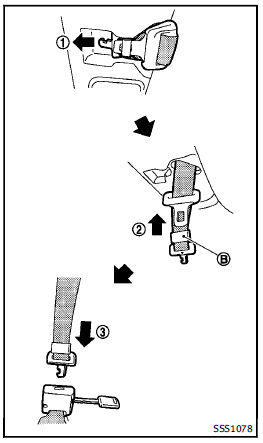
Attaching 3rd row center seat belt:
Always be sure the 3rd center seat belt connector tongue and connector buckle are attached. Disconnect only when folding down the 3rd row seat. To connect the buckle: 1. Pull out the connector tongue from the retractor base 1 . 2. Pull out the seat belt tongue from the tongue holder B 2 . 3. Pull the seat belt and fasten the connector buckle until it clicks 3 . The center seat belt connector tongue and buckle are identified by the and mark. The center seat belt connector tongue can be attached only into the 3rd center seat belt connector buckle. To fasten the seat belt, see “Fastening the seat belts” earlier in this section.
 WARNING
WARNING
► When attaching the 3rd center seat belt
connector, be certain that the seatbacks
are completely secured in the latched
position and the 3rd center seat belt
connector is completely secured.
► If the 3rd center seat belt connector and
the seatbacks are not secured in the
correct position, serious personal injury
may result in an accident or sudden
stop.
Storing 3rd row seat belt buckles
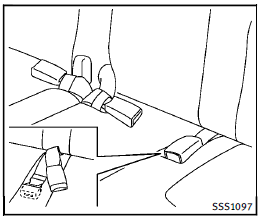
Before folding down the seat, put the buckles in the storage of the seat cushion to avoid dropping it under the seat cushion.
Shoulder belt height adjustment (for front seats and 2nd row seats)
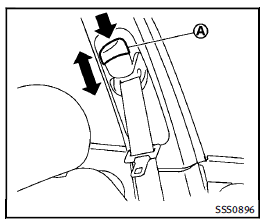
The shoulder belt anchor height should be adjusted to the position best for you. (See “Precautions on seat belt usage” earlier in this section.). To adjust, push the button A , and then move the shoulder belt anchor to the desired position, so that the belt passes over the center of the shoulder. The belt should be away from your face and neck, but not falling off of your shoulder. Release the adjustment button to lock the shoulder belt anchor into position.
 WARNING
WARNING
► After adjustment, release the adjustment
button and try to move the shoulder belt
anchor up and down to make sure it is
securely fixed in position.
► The shoulder belt anchor height should
be adjusted to the position best for you.
Failure to do so may reduce the effectiveness
of the entire restraint system
and increase the chance or severity of
injury in an accident.
See also:
Air pollution
Industrial pollution, the presence of salt in the air in coastal areas, or heavy road salt use will accelerate the corrosion process.
Road salt will also accelerate the disintegration of paint surfac ...
LATCH lower anchor
WARNING
Failure to follow the warnings and instructions for proper use and installation of child restraints could result in serious injury or death of a child or other passengers in a sudden stop or ...
Difference between predicted and actual distances
The distance guide line and the vehicle
width guide line on the front and the
rearview should be used as a reference
only when the vehicle is on a level, paved
surface. The distance viewed on ...
